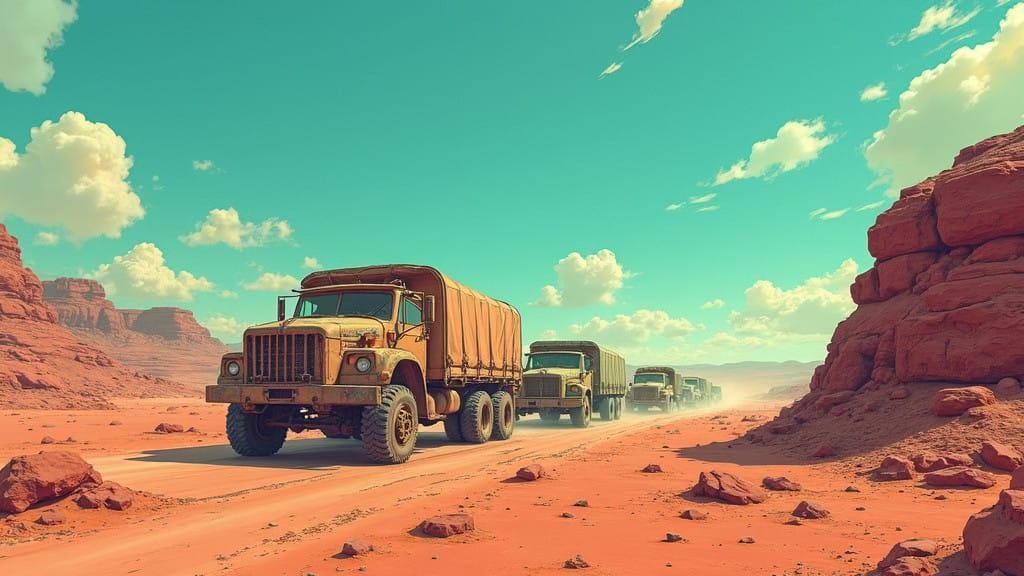They drove across the plain all day, camped, and drove all day again, a convoy of lorries and scramblers, picking their way across the fractured badland landscape. Then they did it a third day, across endless flat wastelands.
Iphigenia was beautiful if you liked lots of open space and barren places and not much cloud in the sky. One of the settlers in the convoy, Vihaan, said except for the color of the sky, it looked like Mars. He’d been there, Vihaan had, for several years, while the ships were under construction, negotiating with SpaceX over the engines.
“The sky would look like Mars, too, if it weren’t for the ventiplankton,” he noted.
A convoy of forty lorries, ten scramblers, and a handful of light passenger-lorries heading north to the site of the new polis.
Polis. Halid wasn’t sure what he thought of the politics, but he knew he couldn’t change it. Their children spun away to be strangers, far across the planet. He held onto the steering bar of the truck, shaken by the wind rattling the canvas behind, staring down the pale marks on the landscape where the trucks had already gone back and forth many times, taking supplies to drill artesian wells and set up the first buildings.
He looked to the right. Safiya was sitting there, hanging on to the strap inside the door, her hair blowing, her brown cheek all that was visible of her face. They were close to the colony site. He’d asked her to sit with him one last time.
“I need to sit back with my friends. We’re talking about our plans.”
Of course, what she had said was Mi devas sidiĝi kun miaj amikoj. Ni parolas pri niaj planoj, because she refused to speak Tausug anymore.
“Just sit with me an hour, Safiya. You won’t be seeing me every day again, you know.”
Of course, what he thought was, I won’t ever see you again.
So she sat in the cab with him and didn’t look at him, and they drove a long time, with only his thoughts to talk to.
They got to the site the third afternoon. It didn’t look like much. There were water derricks. Tents. Some rattle-trap buildings. A stone admin building. A field of native plants that would soon be swept away after growing there for the last nine, ten thousand years, the poor things. Weird, wind-carved rocks. Metaplastoc and kalspex structures where the bioengineers were already making clones of livestock, wildlife, and tanks full of microorganisms for the new soil.
The convoy pulled to a halt. Safiya was gone as if she never existed. The door slammed hard
He sat in the cab alone, with his hands on the steering bar. Dust was settling everywhere, and loud voices chattered in the new language.
Vihaan was at the window, grinning at him. “Awake, Halid?”
“Sure,” he said, making the words come out, hard and ungainly. “I’m just resting my arms.” He put his hands in his lap. “What an ugly place,” he said.
“It won’t be. It’ll be a garden someday,” Vihaan said. “There’ll be grass. Fields.”
Halid got out. The ground was dusty, covered in shards of stone as if someone had poured out God’s own supply of smashed roofing tiles. His boots ground them underfoot.
“I hope my daughter likes this place,” he said. The sky was clearest aquamarine, the sun brilliant yellow. The wind was a bit chilly, and he buttoned his jacket.
Vihaan slapped him on the shoulder. “Let’s find the foreman, eh?”
“Ni trovu la skipestron, a?” Halid echoed.
They walked to a high bit of ground near the admin building where men and women with tablets were directing teams. The light was intense but his heart was heavy, and everything looked dark to him. One of the men was that man Feng whom Safiya talked about when she would talk to him. He grinned, unaware of Halid’s mood.
“Mistr’ Ladjubassal!” he said. “Good to see you! Where’s Safiya?”
Halid waved around. “Ŝi estas ie.”
Feng nodded, his straight black hair waving in the wind’s constant drone. “What truck did you drive?”
“Seventeen.”
“That goes to tent twenty-three,” Feng said.
“Seventeen to twenty-three. Hear that, Vihaan?”
“Seventeen to twenty-three,” Vihaan laughed. “Let’s go!”
Vihaan would be a town councilor here. Halid would go back to his gardens in Landing and sit with Nadzwa, their children gone.
Joyful Sun, he thought, looking at the neat square grid of streets and tents and buildings. The new polis was called Joyful Sun, in a couple of the old, abandoned languages nailed together in the way the council liked to do. Helios was Greek, shad was Farsi, and it did not look joyful to him, and he wished, in his heart of secret hearts, for the rain and green of Mindanao again, or for his daughter to be three again, or something, anything. Anything was better than losing her to this place, and to this man, and to this language.





